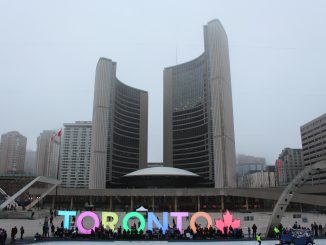The University of Toronto’s sessional faculty and teaching assistants are threatening to strike on Feb. 27, potentially affecting two-thirds of all in-class teaching.
Seven thousand teaching assistants, sessional instructors, lab technicians and writing coaches seeking job security and better wages.
The Canadian Union of Public Employees (CUPE 3902) has multiple units, two of which are currently seeking out new contracts with university administration.
Unit 1 is comprised of teaching assistants and course instructors who are still students, while Unit 3 is made of 1000 sessional faculty members like music professors and writing instructors, who collectively teach upwards of 700 courses.
The university has refused both proposals, citing the province’s wage freeze for public sector workers.
The university is only partially funded by the province, with most of its money coming from tuition and private donations.
Although sessional faculty teach approximately 35 per cent of the university’s undergraduates and have the same qualifications and experience as permanent faculty members, their salaries comprise 1 percent of the university’s budget.
Under the current agreement, the maximum a sessional faculty member can earn for teaching a half course is $7,925.
Yet, most of Unit 3’s demands have more to do with long term job security than the 3.5 per cent pay raise.
In the current system, sessional lecturers must re-apply to teach every semester, placing them in constant fear of termination.
While a 3.5 per cent raise for sessional lectures may be possible, TAs are asking for an increase closer to 20 per cent.
“Our teaching assistants have been making $15,000 a year since 2008 without an increase, and we think they should be moving towards $23,000, which is the low-income cut-off in Toronto,” said Ryan Culpepper, a PhD student, teaching assistant and chief union negotiator.
Although a TA’s hourly rate is $42.05, the university caps TA hours at 205 per year, regardless of extra hours worked.
Moreover, Culpepper says graduate students are expected to work full time on original research.
Based on a conservative estimate of 40 hours a week for 24 weeks a year, TAs are making about $6.65 for every other hour they are working.
Undergraduates are expected to be hit the hardest, with possible classes and tutorial cancellations and even the threat of an extended school year.
Earlier this year, U of T announced a $194.4 million surplus. Traditionally, the university uses the surplus from good years to pay the deficit for bad years.
Since August 2012, there has been not increase to the base rate wages and benefit levels have remained the same for the past decade
Scott Prudham, president of the Univerity of Toronto Faculty Association (UTFA), will meet with university officials this Thursday to discuss the concerns of the professors about the Policy on Academic Continuity.
officials this Thursday to discuss the concerns of the professors about the Policy on Academic Continuity.
The policy was launched to prevent a campus shutdown akin to the three month walkout of teaching assistants and contracted staff that halted classes for 45, 000 students at York University in 2009.
2009.
In 2008, a TA strike at the university lead to a 16.7 per cent increase taking their salaries from $12,500 to $15,000.
lead to a 16.7 per cent increase taking their salaries from $12,500 to $15,000.
CUPE 3902 and U of T’s administration are still trying to find a compromise.
In 2008, York University experienced a strike that lasted 11 weeks, effectively shutting down the school for half the year. Classes were instead extended into the summer months.
half the year. Classes were instead extended into the summer months.

